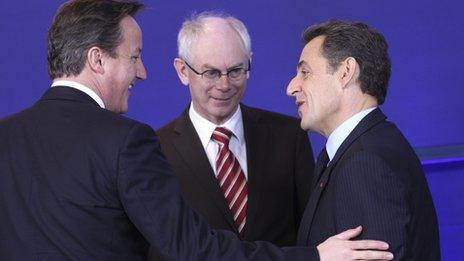Britain uses its veto
- Published
- comments
For years people have talked about a British veto. For years it has existed as a threat never used. Not any more.
The consequences could scarcely be greater for Europe and for Britain's relationship with Europe.
There will now be a series of angry rows and legal challenges about what this new euro club-within-a-club can, and can't discuss, and whether it should be allowed to use EU resources and officials.
The safeguards for the City of London which David Cameron fought for but didn't win will also be the focus of a protracted fight.
Since the vast majority of the EU's members and all its most powerful economies - bar Britain - will be in the new club, many Eurosceptics will demand a wholesale renegotiation of our membership of the EU and a referendum on it - something which would be a coalition breaker.
This veto is not the end of something. It is the beginning of a story whose end is quite unpredictable.
Update: Deputy Prime Minister Nick Clegg discussed the EU negotiations with the prime minister throughout last night and had agreed to the use of the veto, according to senior Tory sources. I have yet to confirm this with the Liberal Democrats.
The prime minister and his senior ministers will argue that the future of the euro remains totally unpredictable so that now is not the time to pursue a renegotiation of Britain's relationship with the EU or to hold a referendum.
- Published9 December 2011
